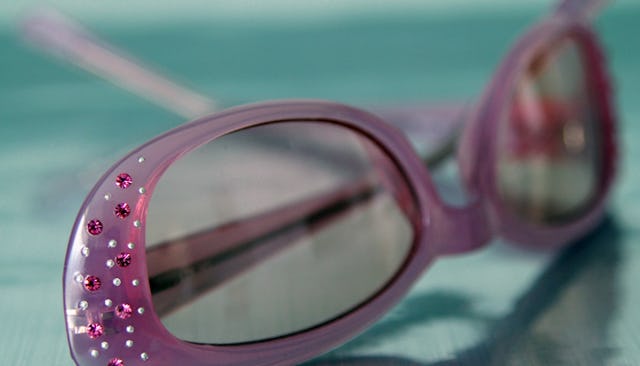Seeing Through Mommy Goggles

When I was in junior high, I had a bit of a crush on George Michael. That was before he came out, so I thought I actually had a chance.
Remember George Michael’s song, “I Want Your Sex”? I remember thinking it was fairly questionable for me to be singing along to it when I was a young teen. As a mother, my thoughts are more along the lines of, My God, what were our parents thinking?
Now, a few decades later, it’s Rihanna singing, “Sex in the air, I don’t care, I love the smell of it,” and me changing the channel on the radio before our kindergartener memorizes the chorus and belts it out at family functions. (There’s a precedent here.)
The amount of childhood-innocence-crushing debauchery in our everyday lives is a bit shocking (I’m looking at you, tabloid magazine covers in the grocery checkout), and the fact that most people take little notice of it is perhaps a bit telling. But those things become magnified as you start looking at the world through the lens of motherhood—or what I refer to as “mommy goggles.”
Through mommy goggles, something that previously seemed harmless or perhaps just slightly bothersome suddenly becomes a heinous horror that will ruin your angelic children and cause of the downfall of humanity. (I’m looking at you, Miley.)
The unsavory world that mommy goggles reveals starts early. I used to think that little-kid shows like Caillou and Arthur were totally benign—educational, even. Then I had a 3-year-old, and suddenly, Caillou became the shady kid in the corner pushing tantrums and whining on innocent preschoolers. Arthur and D.W. became bratty siblings who teach kids new and creative ways to insult one another. It’s not Jersey Shore by any means, but those mommy goggles magnify disturbing details you never noticed before.
How about Nickelodeon or the Disney Channel? I thought those were quality family programming—not anymore, with their snotty, disrespectful, materialistic teenagers mouthing off to their parents and each other. People recall her as a sweet little girl before she started sticking her tongue out all the time, but Hannah Montana wasn’t exactly a role model herself. Rude much?
One day, I was sitting with my nieces and nephews who were watching a show on Disney. It was rated TV-7. One character, a teenage boy, was sitting in a booth in a soda shop making out with a teen girl. That alone was a bit much for a kids’ show. Then his friend walked over and cleared his throat, prompting make-out boy to dismiss his girl toy. Then, when the friend asked what he was doing, make-out boy responded, “What? I bought her a Coke first.” Cue canned laughter.
I was stunned. Not that such scenes exist (obviously, there are a lot worse things), but I couldn’t fathom how this was on a show being marketed to preteens. I know a lot of kids who watch Disney channel and Nickelodeon without any parental supervision whatsoever. Who doesn’t trust Disney, for crying out loud? But every time I’ve turned it on, it’s made me want to weep and hide my children away in a tower with nothing but Mr. Rogers’ Neighborhood playing on repeat.
Occasionally, I recognize mommy goggles for what they really are: fear and worry. I’m afraid of the effect pop culture might have on my children’s character. I worry about the influences of mass media and consumerism. I’m afraid that my attempts at instilling wisdom and discernment will be drowned out by the river of garbage raging by. I worry that my kids will decide it’s too hard to swim against that stream and hop aboard a yacht with Justin Bieber.
I know I can’t shelter them from everything, nor is that a desirable goal. Like letting kids play in the dirt to develop their immune systems, there’s a certain degree of healthy exposure to unhealthy things that kids need in order to learn how to navigate those waters. So sometimes I think maybe I need to take off the mommy goggles and give myself some blissful ignorance.
Then again, I think I’d rather err on the side of caution. Fear and worry are not always unfounded. I don’t trust the people trying to sell things to my kids. I don’t trust the entertainment industry that pushes sexuality on younger and younger ages. I don’t trust corporations that use popularity to push whatever marketing message will make them the most money this month.
While those things are inevitably going to creep into our lives, we don’t have to welcome them in with open arms. There’s a big difference between mopping up some seepage and dealing with a full-on flood. There’s also a big difference between kids being left alone with those things and parents helping them filter it with conversations about critical thinking and discernment.
We chose to shelter our kids from a lot of things when they were young. As they’ve gotten older, we watch and read things together. We talk a lot about being aware of what we choose to allow into our minds. We talk about how the media we consume can affect us intellectually, emotionally and spiritually. We talk about why marketers and celebrities make the decisions they do. We talk about specific shows and scenes and scenarios in real life. We talk a lot.
But I still worry. Maybe I always will. These mommy goggles will someday become Grandma Goggles, and who knows how they will see the world. Maybe the twerking and tongue-wagging of the 2010s’ celebrity scene will pale in comparison. Maybe it’ll be better. Maybe it’ll be worse. Maybe by then, I’ll have learned through experience that kids are more influenced by their parents than by pop culture.
I certainly hope so.